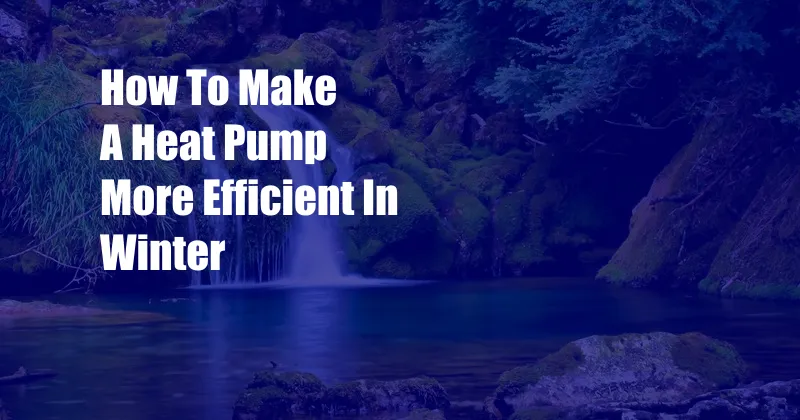
Heat Pumps: Unlocking Winter Efficiency
As the winter season arrives, our heating systems bear the brunt of keeping our homes comfortable and warm. Heat pumps, an energy-efficient alternative to traditional furnaces, play a crucial role in reducing energy consumption and lowering heating costs. However, maximizing their efficiency in the colder months requires mindful operation and proper maintenance.
Unveiling the Winter Efficiency Secrets
Heat pumps work by extracting heat from the outdoor air and transferring it into your home. In winter, when outdoor temperatures drop, heat pumps can face challenges in meeting the heating demands of a home. However, by understanding their operation and implementing some simple tips, you can enhance their efficiency and reduce energy usage.
Optimizing Defrost Cycles
Defrosting is an essential process for heat pumps. As they extract heat from the outdoor air, frost accumulates on the outdoor coil, reducing efficiency. Modern heat pumps have defrost cycles that automatically remove this frost, but optimizing these cycles can improve performance. Ensuring the outdoor coil is free of obstructions like leaves or snow can reduce the frequency of defrost cycles. Additionally, adjusting the thermostat to a slightly higher temperature during defrost cycles can accelerate the melting process and minimize downtime.
Selecting the Right Heating Mode
Heat pumps offer multiple heating modes, including electric resistance heating and heat pump mode. Electric resistance heating generates heat directly and is more energy-intensive. In cold climates, it may be necessary to use electric resistance heating as a supplemental heat source. However, whenever possible, prioritize heat pump mode, as it utilizes the heat pump’s energy-efficient operation.
Regular Maintenance and Service
Proper maintenance and servicing are vital for maintaining heat pump efficiency. Replace the air filter regularly to ensure adequate airflow and prevent dust and debris from accumulating on the coils. Schedule professional maintenance with a qualified HVAC technician to inspect the system, clean the coils, and ensure proper operation. A well-maintained heat pump will operate at optimal efficiency, reducing energy consumption and extending its lifespan.
Latest Trends and Innovations
Technological advancements continually enhance the efficiency of heat pumps. Variable-speed compressors allow heat pumps to modulate their output based on the heating needs of the home, reducing energy consumption during mild weather. High-efficiency models boast higher COPs (Coefficient of Performance), which quantify the efficiency of heat pumps. By considering these advancements, homeowners can choose the most energy-efficient heat pump for their specific needs.
Expert Tips for Winter Heat Pump Efficiency Enhancement
-
Monitor and Adjust Thermostat Settings: Adjust the thermostat to maintain a consistent temperature and avoid frequent temperature fluctuations, which can trigger unnecessary defrost cycles.
-
Utilize Curtains and Blinds: Keep curtains and blinds open during the day to allow sunlight to enter and warm the home naturally, reducing the need for the heat pump.
-
Consider a Heat Pump Blanket: Wrap the outdoor unit with a heat pump blanket to minimize heat loss and improve efficiency during extreme cold temperatures.
-
Avoid Obstructions Near the Outdoor Unit: Ensure there is adequate airflow around the outdoor unit by removing any obstructions like snow, leaves, or debris.
Empowering Homeowners with Energy-Saving Knowledge
By implementing these expert tips, homeowners can empower themselves with the knowledge to maximize heat pump efficiency during the winter months. By optimizing defrost cycles, selecting the appropriate heating mode, maintaining the system, and staying informed about the latest advancements, energy consumption can be reduced, heating costs can be lowered, and the comfort of a warm home can be preserved.
Frequently Asked Questions about Heat Pump Efficiency in Winter
Q: Why is my heat pump less efficient in winter?
A: Cold outdoor temperatures make it harder for heat pumps to extract heat, leading to a decrease in efficiency.
Q: How can I minimize defrost cycles?
A: Keep the outdoor coil clear of obstructions, and adjust the thermostat slightly higher during defrost cycles to accelerate melting.
Q: Is electric resistance heating more efficient than heat pump mode?
A: No, heat pump mode is more energy-efficient as it utilizes the heat pump’s ability to extract heat from the outdoor air.
Q: What is the COP of a heat pump?
A: The COP quantifies the efficiency of a heat pump. Higher COP values indicate higher efficiency.
Q: How often should I service my heat pump?
A: Annual professional servicing is recommended to maintain optimal efficiency and extend the lifespan of the system.
Conclusion
With the arrival of winter, heat pumps take center stage in providing comfortable and energy-efficient warmth. By understanding the principles of their operation and implementing the strategies outlined in this article, homeowners can unlock the full potential of their heat pumps. By optimizing defrost cycles, selecting the appropriate heating mode, engaging in regular maintenance, and embracing the latest innovations, you can reduce energy consumption, lower heating costs, and ensure a warm and comfortable home throughout the winter season.
Is maximizing heat pump efficiency in winter a topic that interests you? Share your thoughts and experiences in the comments below!